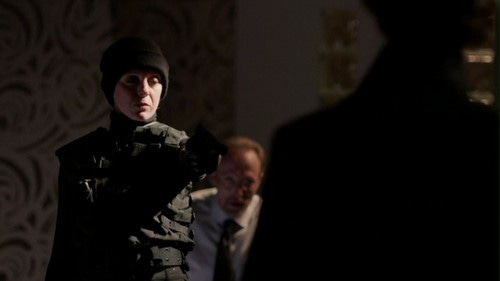Written by Prof. Jenn
As a reminder: I am writing these as RETROSPECTIVE reviews, so I will be discussing reveals, revolutions of cliffhangers, ends of plots, etc. If you are reading these reviews without having seen the eps, a) what is wrong with you?? Go watch them now! and b) these reviews are not for you till you’ve seen them.
Another reminder: this, as were the others, was first posted on British fansite Sherlock’s Home, this one in 2016. It’s been changed slightly since then.
Hey, everyone, we’ve only got one of these left from Sherlock’s Home; want me to put myself through the torture of re-watching Season 4, after that one’s posted, for the sake of your entertainment? Let me know in the comments—I hate to do it to myself again but I also would like some final closure on these retro reviews. What do you think?
SPOILER ALERT: yup, I did indeed do this. Stay tuned as those retro-reviews open up batch by batch, these next couple weeks.
In the original canon (‘The Master Blackmailer’), Sherlock Holmes has this to say about Charles Augustus Milverton:
“Do you feel a creeping, shrinking sensation, Watson, when you stand before the serpents in the Zoo, and see the slithery, gliding, venomous creatures, with their deadly eyes and wicked, flattened faces? Well, that’s how Milverton impresses me. I’ve had to do with fifty murderers in my career, but the worst of them never gave me the repulsion which I have for this fellow. And yet I can’t get out of doing business with him—indeed, he is here at my invitation. … He is the king of all the blackmailers. Heaven help the man, and still more the woman, whose secret and reputation come into the power of Milverton!
…With a smiling face and a heart of marble, he will squeeze and squeeze until he has drained them dry. The fellow is a genius in his way, and would have made his mark in some more savoury trade. His method is as follows: He allows it to be known that he is prepared to pay very high sums for letters which compromise people of wealth and position. He receives these wares not only from treacherous valets or maids, but frequently from genteel ruffians, who have gained the confidence and affection of trusting women. … I happen to know that he paid seven hundred pounds to a footman for a note two lines in length, and that the ruin of a noble family was the result. Everything which is in the market goes to Milverton, and there are hundreds in this great city who turn white at his name. No one knows where his grip may fall, for he is far too rich and far too cunning to work from hand to mouth. He will hold a card back for years in order to play it at the moment when the stake is best worth winning. I have said that he is the worst man in London, and I would ask you how could one compare the ruffian, who in hot blood bludgeons his mate, with this man, who methodically and at his leisure tortures the soul and wrings the nerves in order to add to his already swollen money-bags?”
Charles Augustus Magnussen, the counterpart to Milverton in this show, is much less subtle than Milverton. His audacious claims that he owns people, his declaration that he doesn’t need facts, and the melodramatic, way over-the-top actions he takes—like licking Lady Smallwood’s face, pissing in the fireplace of 221B, or flicking Watson’s eyeball like a 12-year-old schoolyard bully—are ostentatious, almost ridiculously nasty.
I was musing about this fact, when I read the above description of the original character again, and I realised that this is exactly what was needed to create a character which would engender that kind of visceral repulsion in a modern audience. Watson, in the original adventure, says that “[he] had seldom heard [his] friend speak with such intensity of feeling,” when describing Milverton, and it takes a lot to depict the sort of man who would cause such an intense reaction in a modern-day setting, where we’ve seen it all, and it’s nigh impossible to shock anyone. So I’m now prepared to forgive what could be construed as an over-the-top character, in that he needs to be so, in order to be this repulsive. This, plus his announcement that “I don’t have to prove it; I just have to print it,” shows the dangerous insidiousness of this updated villain for current viewers, and makes his murder that much more necessary.
We begin (after a prologue scene where we first see and are perhaps fooled by Magnussen’s glasses/reading about people bit) with an opening scene straight out of ‘The Man With the Twisted Lip’: Kate Whitney comes over to John and Mary’s house, upset that Isaac Whitney, her son, has been away for days at a crack house. In the original, it’s Isa Whitney, her husband, at an opium den, but the scene unfolds in just the same way, with Watson going to fetch him and finding not only him but Sherlock there too. There’s a cute bit where John sleepily asks, “Husband?” and Mary corrects, “Son,” which is no doubt a nod directly for us readers who know the story well.
Also directly taken from canon is the scheme that Sherlock comes up with to break into Magnussen’s office (in the original, it’s to break into Milverton’s house, also called Appledore): he becomes engaged to Magnussen’s PA (in the original it’s Milverton’s scullery maid). In the original, poor Agatha is never heard of again, but here, Janine gets her revenge in a gloriously Easter-Eggy way: she has sold enough lies about Sherlock to the tabloids that she is retiring to a cottage near the Sussex Downs (they’ve got beehives but she’s getting rid of them). This is a clear reference to Holmes’ Sussex beekeeping retirement in the books.

Speaking of Easter Eggs, there are SO MANY in this episode it’s frankly ridiculous, so I will close by listing just a few of them for you:
Billy Wiggins is a composite name from two of the boys from Holmes’ Baker Street Irregulars that he particularly uses for assistance and special cases. Actually Billy becomes his page, and we get the idea that Billy in the show will be recurring in this sort of capacity too.
The knocked-out bodyguard has five pips tattooed on his hand. After seeing this, Sherlock declares he’s a white supremacist. The Five Orange Pips were a murderous sign left by the KKK in the canon.
The thumb drive with Mary’s past written on it is marked A.G.R.A., which she says is her initials. In The Sign of Four, the original novel wherein Mary Morstan and John Watson get together, the Agra treasure is the sought after fortune of which Mary owns a portion, and which is lost in the Thames during the climactic boat chase.
William Sherlock Scott Holmes is widely thought by Sherlockian scholars to be Holmes’ full name.
There’s a recurring threat Mycroft gives Sherlock: “There’s an East Wind coming.” In the show, it’s described as a sort of childhood story thing.* In the original ‘His Last Bow’ (named nearly identically to this ep), it’s an apprehensive phrase Holmes remarks to Watson at the conclusion of the mystery, referring to the onset of WWI.
CLOSING THOUGHT: I dunno, but I thought the cute Christmas scene at the Holmes’ with Mum and Dad was a bit too cute and private-jokey for my tastes. Just me? Yeah, I didn’t think so. It’s over-egging the pudding, especially since we know that the actors portraying the Holmes parents are Benedict Cumberbatch’s actual parents irl. Nepotism, thy name is fanservice Sherlock…
CLOSING QUESTION: Who on earth is “the other one”???*
*Like I said: do I really need to rewatch Season 4? I kinda do, don’t I. Sigh…
~Past Me: Yes, you do. And did. And it was glorious. Signed, Present Me.
RATING: 2.5 flicks to the eyeball out of 5





